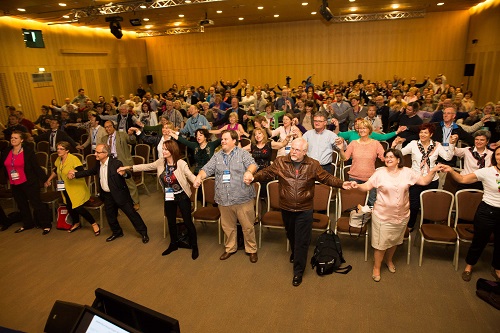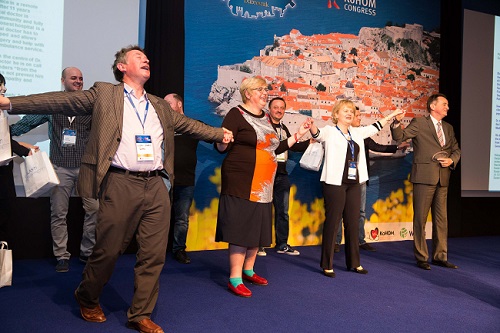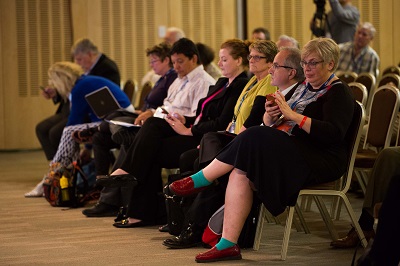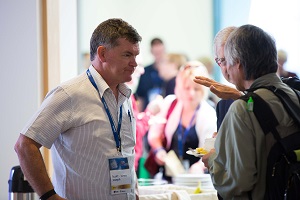World rural conference in Dubrovnik - report from Jo Scott-Jones
 All photos are courtesy of Conventus Credo (professional conference organisers of the WONCA World Rural Health conference in Dubrovnik). These and more can be accessed at the link below.
All photos are courtesy of Conventus Credo (professional conference organisers of the WONCA World Rural Health conference in Dubrovnik). These and more can be accessed at the link below.
Conferences are confusing.
There is an excitement about preparation, hopes around outcomes and anticipation of re-establishing old connections, and of making new ones.
There is the travel and dissociation from the “real world” – perhaps this was more acutely felt arriving in Dubrovnik which is an amazing 15th Century walled town used as a set for the
Game of Thrones TV series.
There are late nights, early mornings, last minute changes to make in presentations, over coffee conversations ad-hoc meetings and whirl of new ideas, challenges and commitments that suddenly ends.
There is then a return to normal life and a period of let-down and recovery, and you look back and think what on earth happened?
A great conference leaves an impression that lasts, a great health conference creates something new that impacts on patient outcomes.
On this measure, Dubrovnik was a great conference.

One of the key moments I have taken away was the closing ceremony – 1200 delegates holding hands, singing Queen’s “
We are the Champions” in a celebration of rural practice and the work our rural heroes have undertaken that enable us to be where we are today. It sounds a bit cheesy writing it down – but the sense of camaraderie, support and mutual appreciation that everyone took away from the conference I suspect will sustain them in their practice in the coming year.
Maja Racic from Bosnia Herzegovina shared the value of being part of WONCA – “It is so much easier, even as a woman in Bosnia, to be heard when you have six other countries standing beside you” – the links she has made through WONCA being instrumental in her ability to drive the development of family medicine training in her country.
Rich Roberts, immediate past president of WONCA, shared his insights into the role of family doctors around the world, building bridges that change the world, addressing the personal, community, political and future focussed roles that every one of us can fulfil. Inspiring.
Amanda Howe, WONCA President elect, gave a fantastic keynote speech about gender equity with a number of challenges for us as organisations and individuals. The key point for me would be the reflection that until ALL our processes are gender neutral we need to keep a clear focus on ensuring the way we do things is appropriate and accessible to young women, this means being family friendly in our conferences, meeting times and work expectations.
Barbara Doty from the USA talked about Climate Change and our role as rural family physicians, taking the conversation away from hybrid cars and vegetarianism (both of which are v good for the climate) and into the space of community health assessment. The tool she advocated we use is called
BRACE and came from the CDC in the USA - the focus was on communities Building Resilience Against Climate Change Effects and sees well worth exploring. Rhys Jones from
Ora Taio would be a good NZ alternative.

In the social media workshop run by Ewen McPhee on the final day he and his colleagues illustrated the issues by developing debate the pros and cons of utilising social media in health care for education, and patient information. Every country could benefit from a determined policy around use of social media, and provision of social media training for trainees and current providers. On line education through #FOAMed (Free Open Access Medical Education) and #FOAM4GP is a growing phenomenon we should be aware of and promoting.
The impact on patients will become evident as the doctors, nurses and other health professionals who attended the conference take away the shared energy and inspiration - but also a number of practical skills.
For me personally a significant impact that is impacting on my patient care has come from meeting some of the people involved in the Faculty of Medical Leadership and Management from the UK and subsequent involvement in #FMChangemakers tweet chats.
Being a rural doctor can be an isolating experience and the collegial support I am receiving, and giving through these connections is sustaining me in my daily work.
I am looking forward to
the World conference coming to Brazil in 2016 and the next World Rural Conference in Cairns, Australia in 2017.
Photographs of the conference are available to remind participants and whet the appetite of people thinking about coming to
Cairns in 2017
Related articles of news from Dubrovnik conference
Report of activities of WONCA Working Party on Rural Practice in Dubrovnik
New WONCA Working Party on Rural Practice resource page
Engaging students and young doctors with rural health by Veronica Rasic
 Rural heroes project launch
Rural heroes featured
Rural heroes project launch
Rural heroes featured
Jo Scott-Jones (and at right pictured in Dubrovnik)